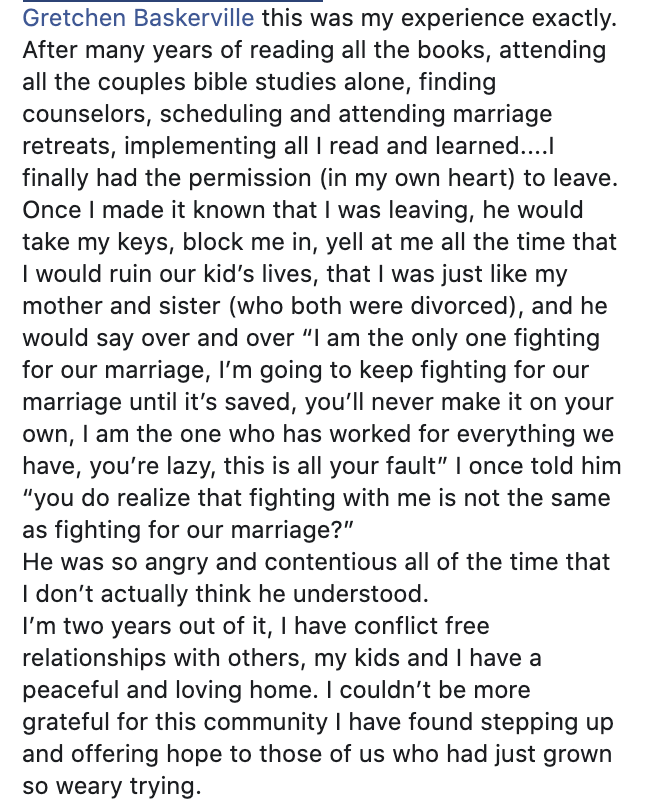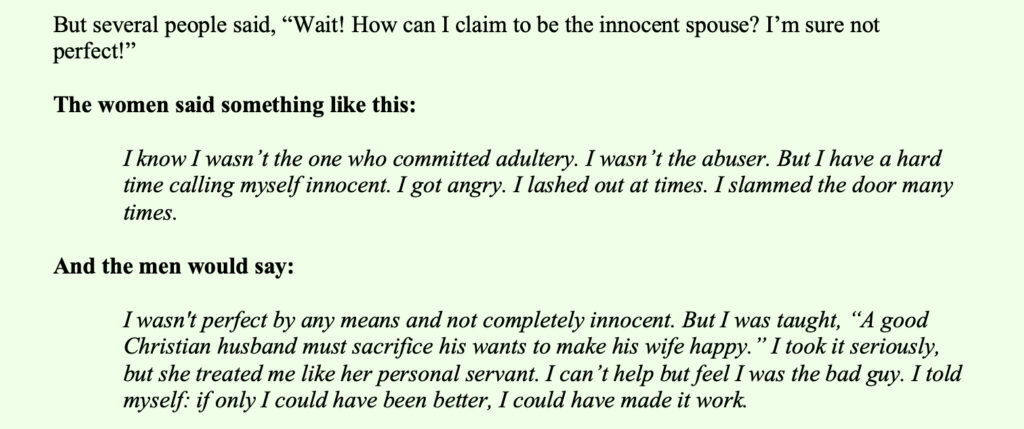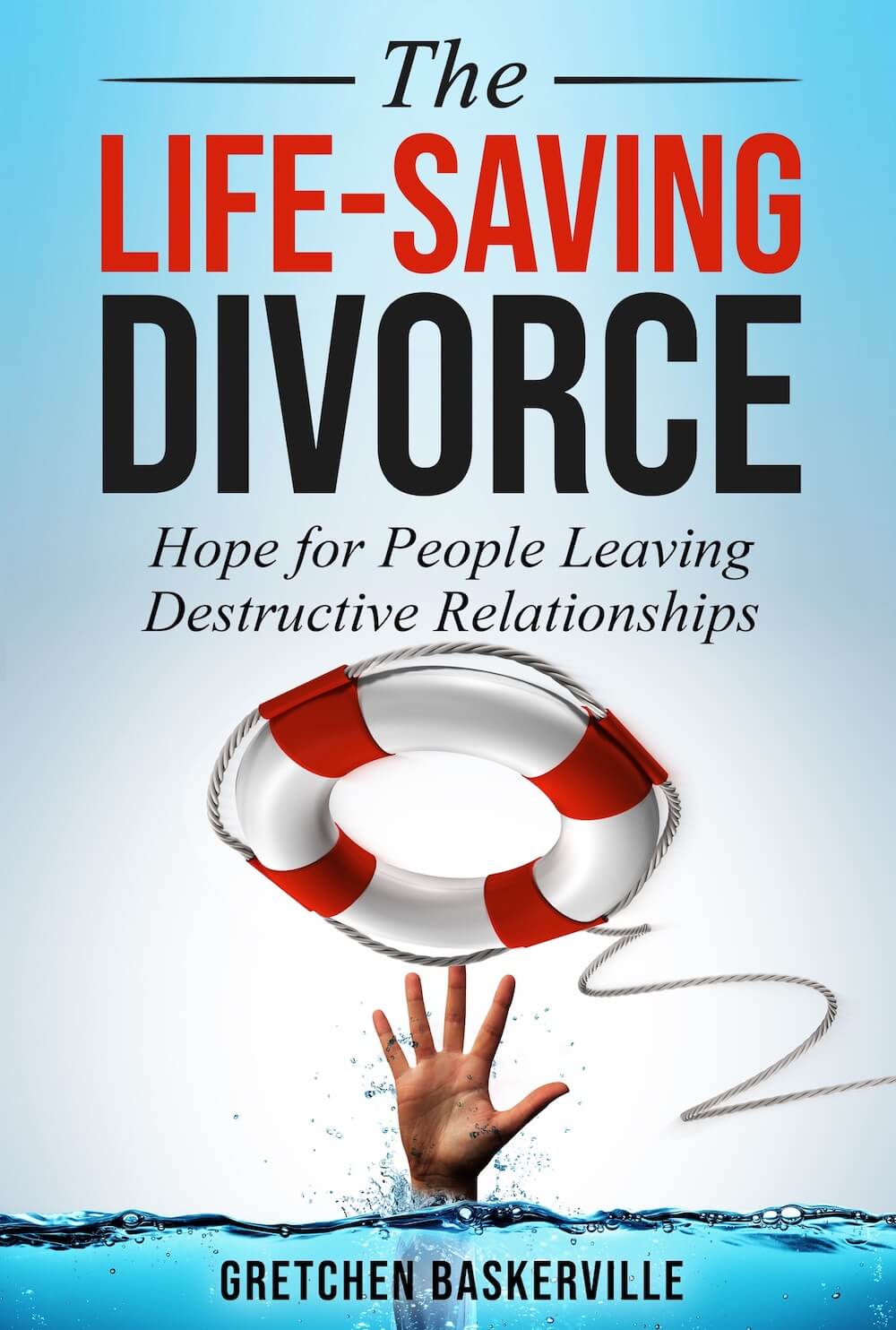Who Destroyed the Marriage?
Recently in my private Facebook group, we were talking about “Who destroyed the marriage?” In half of the divorces in the United States, one spouse was unfaithful, sexually immoral; addicted to drugs, alcohol, porn, or gambling; was physically or emotionally abusive; or some other very serious reason.
“My Husband Says It’s All My Fault even Though I Wasn’t the Cheater or Abuser!”
One woman posted this reply to me and gave me permission to use it publicly without her name. Notice how her husband accused her of “being lazy” and blaming her for the divorce. He claimed HE was the one who was “fighting for the marriage.” But was he really? It’s all so confusing. Who is the innocent spouse? We can figure it out by looking at the lists at the bottom of this article.
Let’s start by looking at her anonymous comment to me on Facebook.

Transcription:
“…This was my experience exactly.
After many years of reading all the books, attending all the couples bible studies alone, finding counselors, scheduling and attending marriage retreats, implementing all I read and learned …. I finally had the permission (in my own heart) to leave.
Once I made it known that I was leaving, he would take my keys, block me in, yell at me all the time that I would ruin our kid’s lives, that I was just like my mother and sister (who both were divorced), and he would say over and over “I am the only one fighting for our marriage, I’m going to keep fighting for our marriage until it’s saved, you’ll never make it on your own, I am the one who has worked for everything we have, you’re lazy, this is all your fault” I once told him “you do realize that fighting with me is not the same as fighting for our marriage?”
He was so angry and contentious all of the time that I don’t actually think he understood.
I’m two years out of it, I have conflict-free relationships with others, my kids and I have a peaceful and loving home. I couldn’t be more grateful for this community I have found stepping up and offering hope to those of us who had just grown so weary trying.”
Note: When we talk about the “innocent spouse” in these situations, some people said, “Hey, I wasn’t perfect. I got angry. I called him/her names. I slammed doors. I had my faults!” They wonder if they destroyed the marriage because they protested when betrayed or injured or lied to.

So Instead of “Innocent” Spouse, Let’s Talk about the the INVESTED Spouse.
Were you the invested spouse for most of your marriage? It takes two to build a good, safe, respectful marriage, and only one to destroy it. I got the concept of “invested spouse” from Christian counselor Bob Hamp. I’m also indebted to Patrick Doyle for introducing me to the idea that we show our investment in the marriage by all the ways we spend time, money, loyalty, and effort into making it a high-quality marriage.
TRAITS OF AN INVESTED SPOUSE
- —May have bought and read marriage books or looked online for ways to be a more loving spouse. [1]
- —Signed up for marriage retreats and classes.
- —Tried to find a counselor their spouse would agree to.
- —Set appointments for marriage counseling.
- —Prayed and fasted about the marriage.
- —Felt tense and afraid when they heard their spouse come home, checking to make sure everything was perfect before they walked in.
- —Journaled and pleaded with the Lord to improve their difficult marriage.
- —Had a lot of self-doubt, wondering if they really tried as hard as they could.
- —Reminded themselves over and over to be loving and forgiving and not to give up hope.
- —They were hard on themselves and scrutinized their own behavior to see if they had sinned.
They doubted themselves. They had sensitive consciences. They second-guessed their own motives. They gave the other spouse the benefit of the doubt. They were hard on themselves and felt guilty, even if no one else criticized their behavior. They internally wanted to become a better person.
- —They criticized themselves, “I shouldn’t have yelled at him like that. I should have had a kinder tone.”
- —They told themselves, “Maybe I should have stayed quiet about the missing rent money. I mean, I’m not perfect, either.”
- —They questioned themselves: “Was I responding with too much anger when I caught him lying?”
- —They gave their spouse the benefit of the doubt over and over: “Maybe she wasn’t really flirting with that guy. She’s just playful and loves to sit on people’s laps.”
- —They apologized even though they did nothing wrong — just to keep the peace.
TRAITS OF AN UN–INVESTED SPOUSE
Some of these traits are evident in the husband’s accusations against his wife (in the FB reply at the top).
Her husband appears to merely wants to be married, he doesn’t invest the time, money, effort, or priority to make the marriage loving, safe, and respectful. How do we know?
He has defined “fighting for the marriage” as blocking her from leaving, using:
- —coercion (taking her keys),
- —physical restraint/bullying (blocking her car)
- —false accusations (“you’re lazy”)
- —fear-bombing (“you’ll ruin our kids’ lives”)
- —intimidation (he’s angry and contentious)
- —demeaning (“you’ll never make it on your own”)
- —devaluing (implying that she has made no contribution to the family’s success).
Rather than changing his attitude and investing to make the marriage loving, safe, and respectful for his wife, he tries to prevent her from leaving. That’s not fighting for the marriage. That’s just stubbornly refusing to accept his responsibility. Notice the end of her story: She left and the kids have a peaceful and loving home now.
Here are some more traits of an UNinvested spouse
- —Excuses or minimizes their own marriage-destroying sin, or tells you you’re too demanding.
- —Blames their bad behavior or attitude on something you did or didn’t do.
- —Uses shame or guilt when you get angry, saying it’s not Christ-like.
- —Doesn’t sit up at night worrying about their own sinful behavior.
- —Doesn’t volunteer to take responsibility for making the marriage loving.
- —Defines “saving the marriage” as blocking you from leaving, taking your keys, and refusing to sign court documents, rather than actually changing their behavior.
- —Tells you to forgive because that’s what true Christians must do.
- —Doesn’t look for ways to improve as a spouse, unless they know you’re upset.
- —May quote Bible verses at you, but insist that you make all the changes.
- —Doesn’t admit sin or misdeeds unless you make a big deal and threaten to leave.
- —Claims you misunderstood, implies you have no right to complain because you’re not perfect either. See pp. 132-142 of The Life-Saving Divorce.)
The woman in the Facebook reply wanted a safe and loving marriage and we have evidence. She’s spent time, effort, and money buying marriage books, finding therapists her husband will see, and arranging for them to go on marriage retreats. She’s changed her behavior to match the advice of Christian marriage book authors. She’s committed. I sense she loved her husband or at least wanted to have a good marriage with him. But after she’d tried everything, she realized these steps have been a one-way street. The marriage isn’t better. It’s actually worse.
When she finally gave up and let him know, he had a choice:
To invest and make the marriage better, or to block her from leaving.
He chose the latter.
How can he claim to believe in the sanctity of marriage? Where is his love and his sacrifice? Does he have a pang of conscience and go to therapy to work on himself? Or does he just get defensive and pressure his wife?
In cases like this, the invested spouse has proven their commitment. Every day they entered that tense home, and faced a person who wasn’t making the marriage loving, they proved they believed in the sanctity of marriage. Every time they sacrificed their own wishes, desires, preferences, and voice, is evidence that they were willing to set aside their own wellbeing to keep the marriage at any cost.
How many more days do you need to prove to yourself that you tried hard enough?
If this describes you, if you need a life-saving divorce to save your life and sanity, and to escape a marriage with adultery, sexual immorality, physical abuse, mental abuse, substance abuse, or abandonment/neglect, you are free to go. And God will still love you. Really.
Footnote:
1 I’m indebted to Patrick Doyle for introducing me to the idea that we show our investment in the marriage by all the ways we spend time, money, and effort into saving it.



 :
:
 Buy PDF
Buy PDF